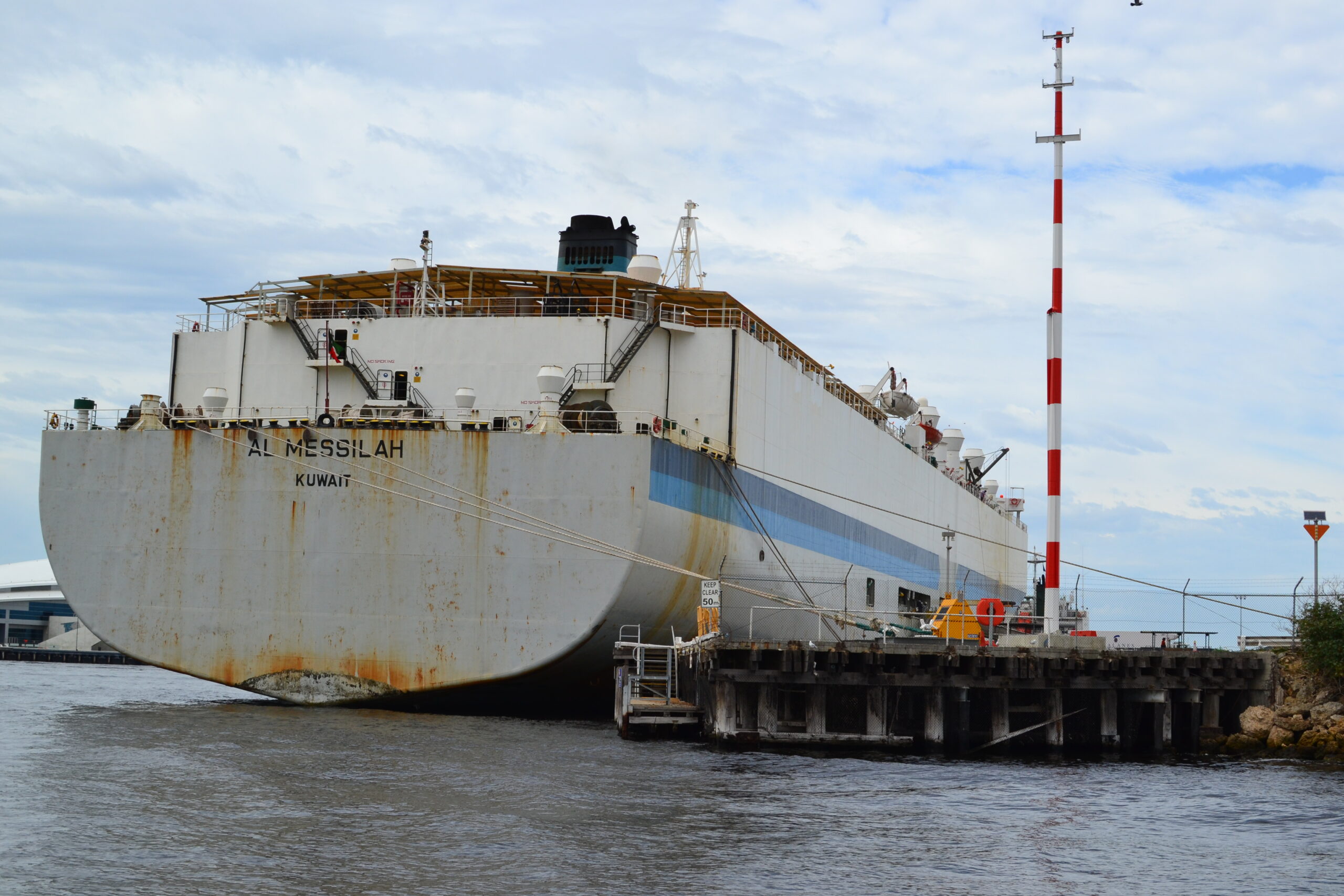Fresh from February’s Cape Town stink-up debacle, Kuwaiti livestock traders and transporters Al Mawashi have another livestock export shipment destined for the Arabian Gulf, and under way at East London.
According to the NSPCA approximately 60 000 sheep, 1 500 cattle and 200 goats will be loaded aboard Al Mawashi’s second ship, a vessel well-known in South Africa, the 44-year-old converted car carrier Al Messilah.
She is estimated to arrive off East London on 2 April.
Page Farming feedlot
The collection of animals has been assembled on Page Farming’s Castledale feedlot at Berlin, outside East London.
Page Farming has a long history of livestock exports. In addition to its involvement with Al Mawashi’s annual export operation, the farm exports cattle to Mauritius on a regular basis.
NSPCA inspectors and veterinarians have been at the feedlot since 26 March monitoring the condition of the animals, and mandating that pregnant, injured and sick specimens be appropriately treated.
The inspection operation has not gone smoothly, however, resulting in a physical altercation between Page Farming supremo Bruce Page and an NSPCA inspector, which necessitated the involvement of SA Police Service members to ensure its continuation.
Five prosecutions
The NSPCA currently has five prosecution cases against Al Mawashi and Page.
Last year’s export debacle saw more than 125 large-horn rams being subjected to horn removal using a chainsaw by the then-feedlot manager. This resulted in the rams being removed from the consignment for treatment, and the arrest of the manager.
As a result of the animal abuse identified during inspections of the annual shipments each year, the NSPCA met with the Eastern Cape Dept: Rural Development & Agrarian Reform (Veterinary Services), who are responsible for monitoring the shipment. The department agreed that the current Guidelines for the Export of Animals by Sea would be stringently followed for future shipments.
Conversion of Livestock Export Shipment Guidelines to Regulations
Moreover, in December last year the NSPCA met with the National Dept of Agriculture, Land Reform & Rural Development (Dalrrd). After discussion it was agreed that the guidelines would be converted to Regulations. In the interim, while the department undertakes the process of conversion of the guidelines to regulations, it was agreed that existing guidelines would be rigorously applied by government officials until the regulations come into effect.
Expensive operation
The NSPCA points out that monitoring of each shipment incurs massive costs for the organisation. Taking part in inspections in March at Castledale were seven NSPCA inspectors, the NSPCA veterinarian and two inspectors from King Williamstown.
Livestock export shipment also diverts resources from government veterinary services who also have to monitor and approve every animal, solely due to the NSPCA’s insistence on prioritising animal welfare.
The NSPCA believes the financial responsibility for these processes should lie squarely with the exporters, who instead “prioritise profit over animal well-being”.
For more information: Marcelle Meredith, executive director, National Council of SPCAs, tel 083 212-3465
Main image: Al Mawashi’s livestock carrier Al Messilah. Sam Wilson, Wikimedia.
COMMENT: Large-scale livestock transportation by sea has repeatedly been shown to be inhumane, cruel and hazardous. Sometimes it has resulted in the loss of up to 20% of the total number of animals shipped (or higher when the ship itself is prevented from docking and discharging due to disease, or catches fire, sinks or capsizes.)
Housed in unsanitary pens on multiple poorly ventilated decks the animals are subjected to unspeakably high temperatures, poor nutrition and lack of abundant drinking water for weeks on end.
As a result, they arrive at their destination having lost condition, reducing their muscle mass and value as slaughter animals – which is their ultimate fate.
There is a better and much more efficient way to export what is, essentially, meat for human consumption. That is to slaughter the animals BEFORE shipment, and ship the deepfrozen carcasses in refrigerated containers. That is what all South Africans who care about animal welfare should be campaigning for. – Editor

